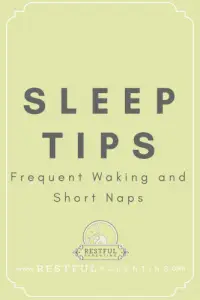Quick Sleep Tips: Frequent Waking and Short Naps
Share this:

As sleep consultants we get asked many questions about sleep. The answers can often vary depending on the child’s age, temperament and the environment, but we thought we would share a few quick tips for sleep based on some of the common questions we get asked.
For older children who frequently get out of bed or wake throughout the night.
Take a picture of them while they are sleeping! Seriously. We know it sounds silly but it can do wonders for them when it comes to feeling safe and secure through the night.
It is very hard for little minds to wrap around the fact that even when they are sleeping, we do still check on them. Taking a picture of them is like proof that we are keeping them safe throughout the night and they can sleep soundly knowing that you are still watching out for them.
Plus they love seeing themselves sleeping!
As with everything when it comes to sleep, it isn’t a magic solution that will instantly stop night wakings. You may need to do it for a week or so to really build that trust and taking a picture is only one small piece that can help.
There are many, many factors when it comes to the older child and their sleep so looking at the big picture will be key in determining the root cause of sleep challenges.
SHORT NAPS!
Short naps are quite common in babies under 5-6 months of age. However, if you work on extending the naps a little bit beforehand, your baby might start to sleep a little longer before that age. Also, when your baby is developmentally ready, it absolutely helps that you have done that work to help them along!
When dealing with shorter naps, it is important to note that you are working with your child’s body clock. Our bodies are affected by certain responses and light/dark to cue us that it is either time to sleep or to be awake. When your child has a short nap, is exposed to light and everyday stimulation that would then signal their body that it is time to wake up (getting up to play, watch television, stimulated by lots of talking etc) this will make it so that their body’s clock continues to wake up at that time rather than learning to sleep through.
Light=Awake
Dark= Asleep
Playing, talking, stimulation and coming out of the sleep environment=Awake.
With all of this stimulation after a short nap, your child’s body clock will set to this short nap wake up and continue to force them to wake up instead of staying asleep!
So try to keep them in their sleep space for a little longer after a short nap (whatever you can handle at first and build on that) you do this by recreating the same thing that you did to put them to sleep in the first place. This will help their internal clocks learn to sleep longer rather than getting up so early!
We can help you with this, so if you are at your wit’s end and could use the support and guidance, contact us and we can chat!
Meet Jennifer Taun
MSW, RSW – Partnering with Restful Parenting

We are excited to introduce Jennifer Taun, MSW, RSW, as a valued partner with Restful Parenting. Jennifer will be providing consultation and supervision support for our team, working closely with Elisa and Pam to ensure our clients receive comprehensive, effective, and compassionate care.



